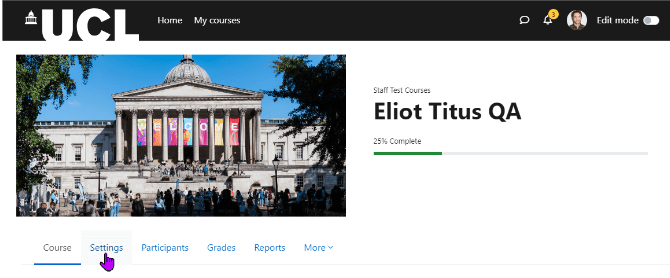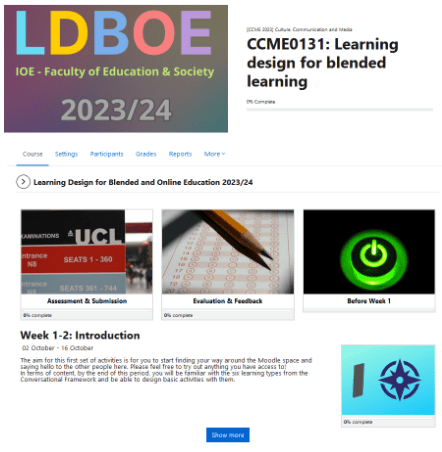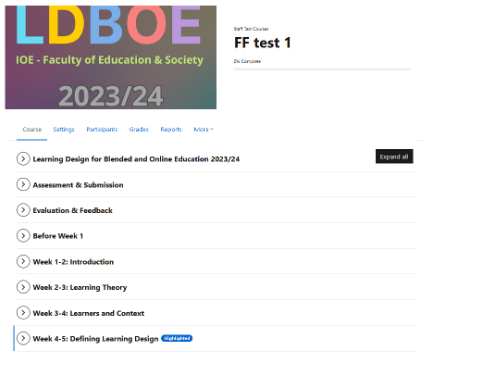Global Deactivation of Portico Mappings
By Pauline Harding, on 20 February 2024
Portico mappings on Moodle pages were globally deactivated on 22 February 2024.
Enrolled students will retain access to their Moodle courses.
How will this impact students on my course?
- Students who are already enrolled on a Moodle course WILL continue to have access to that Moodle course.
- Students who join a Module on Portico WILL NOT be automatically enrolled onto the corresponding Moodle course. Students can still be manually enrolled.
- Students who leave the module on Portico WILL NOT be automatically unenrolled.
Moodle and Portico mappings
If Portico mappings are active on a Moodle course, student enrolments on that course are automatically updated overnight to mirror the student registrations in Portico. Consequently, students who change courses or withdraw from their studies are automatically enrolled or unenrolled from the Moodle course when their Portico record is changed. This is desirable when students change/drop modules within the first few weeks of term, however, if students are automatically unenrolled after they have been awarded grades, these grades become inaccessible, which can be very problematic.
Note: the ‘inaccessible’ grades, submissions and logged activity are not deleted. These can be accessed again if the student is re-enrolled manually, however while a student is no longer enrolled on a course, there is no way to view their content.
Why deactivate Portico mappings?
To reduce the likelihood of this particular ‘inaccessible/missing grades’ problem occurring, Portico mappings have been deactivated on all Moodle courses.
For more information about Portico deactivation and why this is done, please see the wiki guide – Deactivating Portico enrolments.
Can I re-activate Portico mappings on my courses?
Doing so may unenrol existing students in error. Before making any changes, please contact us via MyServices.
The Moodle Flexible course format is being phased out from July 25th
By Eliot Hoving, on 14 February 2024
Why is this change being made?
The Flexible format plugin has reached end of life and is no longer supported by its maintainer. The plugin has multiple usability and accessibility bugs. The planned upgrade to Moodle 4.4 over the summer will further impact both the function and look of the plugin making the format unusable.
What do staff need to do?
Staff using the Flexible format should manually change their course format by the 25th July so they can ensure their course is correctly updated and so they can communicate guidance or notice to students on the course. Note. originally the phase out date was listed as the 19th July but this has been extended. It will now take place during the upgrade to Moodle 4.4.
After the 25th July, Flexible format will no longer be available and courses in this format will be automatically converted to the Topics format (now called “Custom Sections” in Moodle 4.4) to ensure that the course continues to function for students and staff. This includes course from the current academic year and those from previous years.
You can view which course format you are using by going to your course page and clicking settings.
Under Course format you will see the format in use.
Research by the Moodle UX team suggests many staff switched to the Flexible format for its visual appeal and to avoid accessibility issues in the Grid format. Recent updates to the Grid format have significantly improved its accessibility and in this respect it is now preferable to Flexible format. Staff may be tempted to switch back to the Grid format. However, further research by the Moodle UX team shows that using images for each topic/week is not effective unless you take considerable time to design your images. In most cases, images take up space without providing meaningful information to students, or worse they are confusing to students. Staff can continue to use Grid format, however Moodle UX research shows using the Topics format (now called “Custom Sections” in Moodle 4.4) is a better approach for academic courses.
Before (Flexible format)
After (Topics/Custom sections format)
Changing course format will remove any section images, so staff should save these images prior to changing formats if they wish to re-use them.
Staff can experiment with how their course looks in another course format using the 4-demo environment.
The recommended steps for staff to complete would be to
- Test out new course format in the 4-demo environment.
- Save any section images you want to re-use on your live Moodle course (optional).
- Notify your students with a Moodle announcement.
- Change your course format from Flexible Format to the format of your choice.
- Re-add any section images (optional).
- Do a quality check.
Courses from previous academic years and snapshot should be left to automatically switch over to Topics.
Questions?
If you have any questions or concerns, please get in touch with the Digital Education team.
Online Learning: Community of Practice
By Oliver Vas and Jo Stroud, on 13 February 2024
Online Learning is a rapidly expanding area in higher education around the world. While it became a necessity during the pandemic, an increasing number of students and short course learners are choosing to study their degrees fully online. Currently UCL offers around 40 postgraduate programmes with a significant distance learning component, just over half of which are delivered fully remotely.
As such, we’re setting up an Online Learning Community of Practice (OLCoP; catchy, we know) to bring together staff who teach and support online programmes, modules, and short courses at UCL.
At this stage, OLCoP is an informal group, and we hope to use regular meetings and the Teams space to:
- Share best practices in online teaching and learning
- Build a communication hub between academic departments, central, and local services
- Identify and recommend professional development opportunities
- Disseminate new and changing information relating to policy, quality assurance, pedagogies, technology, and more
- Ensure that issues relating to equity, diversity, and inclusion in online learning are properly represented
- Gather actionable feedback from staff and students regarding online learning experiences.
If you are interested in joining, please complete this short form. This will also send you an invite to our Teams space.
We will be holding our first meeting of OLCoP on 13th March 2024 at 2:30pm.
This first meeting will take place as a hybrid event and act as an opportunity to get to know other staff teaching and developing online courses.
Those who wish to attend in person can join us at the training suite at the Anna Freud Centre, not too far from King’s Cross station, while those who prefer to join online can do so via Teams. We will have facilitators in both spaces.
You can register to attend using the form linked above.
We hope you can join us!
Moodle-SITS Marks Transfer Pilot Update
By Kerry, on 9 February 2024
As some of you may be aware, a new Moodle integration is due to be released in the spring which has been designed and developed by the DLE Team to improve the process for transferring marks from Moodle to Portico. It is called the Moodle-SITS Marks Transfer Integration and we are currently trialing this with around 40 course administrators across the institution.
The pilot kicked off on 8 January and will run until 29 February 2024. The purpose of the pilot is to test the Moodle-SITS Marks Transfer Integration using the newly designed Marks Transfer Wizard and its marks transfer functionality that was developed following the Phase 1 Pilot, which took place with a very small group of course administrators at the end of last year. This wizard provides a more streamlined experience for end users by putting the core assessment component information at the centre of the tool which can then be mapped to a selection of Moodle assessments.
Pilot Phase 2 is the last pilot phase before an initial MVP (Minimal Viable Product) release into UCL Moodle Production in late March 2024. Currently, users can take advantage of the integration if the following criteria are met:
- They have used the Portico enrolment block to create a mapping with a Module Delivery on their Moodle course.
- Either of the following assessment scenarios is true:-
- Only one Moodle assessment activity is being linked to one assessment component in SITS.
- Only one Moodle assessment activity is being linked to multiple assessment components in SITS.
- An assessment component exists in SITS to map against.
- The Moodle assessment marks are numerical 0-100.
- The assessment component in SITS is compatible with SITS Marking Schemes and SITS Assessment Types.
- For exam assessments, the SITS assessment component is the exam room code EXAMMDLE.
The Marks Transfer Wizard currently supports the transfer of marks from one of the following summative assessment activities in Moodle:
- Moodle Assignment
- Moodle Quiz
- Turnitin Assignment (NOT multipart)
We intend to collect feedback on the new Marks Transfer Wizard from pilot participants to improve the interface and workflow for a general UCL-wide release in late March 2024 and also to prioritise next step improvements and developments following the launch.
So far informal feedback has been very positive: users say the assessment wizard works well and will save them a lot of time. The pilot has also been useful for exploring where issues might arise with Portico records or Moodle course administration as well as for gathering frequently asked questions and advice on best practice which will feed into our guidance for wider rollout.
#LearnHack 7 reflections
By Geraldine Foley, on 8 February 2024
On the weekend 26 – 28 January I helped to facilitate and took part in the seventh iteration of #LearnHack.
#LearnHack is a community hackathon organised by an interdisciplinary UCL team. The original event was held in November 2015 in collaboration with UCL Innovation and Enterprise at IDEALondon. The 2024 version was the first time it has been run as a hybrid event. It was held over the weekend of 26-28 January in the School of Management department at Canary Wharf in collaboration with the Faculty of Engineering, Digital Education and UCL Changemakers. Participants came from 12 different UCL departments, alumni, and external guests from Jisc. Everyone was invited to submit project proposals for how to improve UCL based on pre-agreed themes. The themes this year were AI and Assessment with overlap between the two.
Being fairly new to UCL I had not come across this event before, but when I was told about the ethos behind it which is to empower a community of staff, students, researchers and alumni to tackle challenges collaboratively and creatively, it sounded right up my street. I am a big advocate of playful learning and creating a safe space for experimentation and failure. I also liked the interdisciplinary approach which encourages people from all backgrounds to work together and learn from each other. Anyone with a valid UCL email address can submit a project proposal to be worked on over the weekend and anyone can run a learning session to share their skills or ideas with participants. Everyone is encouraged to attend welcome talks on the Friday evening to hear about the different projects and get to know each other and form teams. Participants have the weekend to work on their chosen project and also take part in learning sessions.
I’m always up for a challenge, so I not only put forward a project proposal and ran a learning session, but I also helped to facilitate the online attendees on the Friday evening and Saturday morning. This meant it was a packed weekend and I got to experience all the different elements of #LearnHack, including joining online on the second day.
The venue was amazing, with great views of London, and the School of Management spaces were perfect for collaboration and hybrid events. The learning sessions were great, I particularly enjoyed learning how to use Lumi and GitHub to create and host H5P activities outside of Moodle so that they can be shared externally. I also found out about the game that ARC had devised for engineers and developers to learn about the issues associated with generative AI where players can help prevent or create an AI Fiasco.
My own session on making a playful AI chatbot was run online but many people joined from the room. The session encouraged people to experiment with different types of chat bots and have a go at creating their own. We managed to create some interesting applications in the short time we had including a bot that accurately answered questions on using Moodle, Zoom and Turnitin. We also explored how a bot’s personality can impact a user’s interactions and perceptions on the accuracy of its responses and had some interesting discussions on some of the ethical issues involved with users uploading material to datasets.
In-between games, food and learning sessions, teams worked on five different projects. I was impressed with all the project teams and the work they managed to produce in such a short space of time. The winning team stood out in particular, as they created a working prototype using ChatGPT. Their project aims to reduce the time that medical science students spend manually searching through articles looking for replicable research. This team now have Student ChangeMaker funding to create an optimiser to filter through biomedical research papers and extract quality quantitative methods. It is hoped that the ‘protocol optimiser’ will streamline workflows for researchers and students to find suitable lab work. I am looking forward to following the development of their project and hopefully they will report back at a changemaker event later in the year.
Despite smaller numbers of attendees than hoped, feedback from participants was positive with calls to raise awareness amongst the student population with promotion in freshers’ week and from careers to encourage students to join. Personally, I had a great time, although next time I wouldn’t try to do quite so much and would either stick to being involved in a project or helping to facilitate and run sessions. The Faculty of Engineering has already given the go ahead for #LearnHack8 and we are currently exploring possibilities with running some mini #LearnHack events before then, so watch this space for more details and if you have an idea for a project then get in touch.
The Lecturecast Clinic: Appointments now open
By Katy O Foster, on 6 February 2024
As part of the suite of support for users of Lecturecast available for UCL staff, colleagues from the Educational Media team will now be offering one-to-one consultations via The Lecturecast Clinic.
These one-on-one online appointments can be used to address any queries or topics related to Lecturecast, aiming to assist staff with their teaching needs.
Before booking an appointment, staff are also advised to complete the short online course Getting started with Lecturecast (Moodle) to gain a foundational understanding of Lecturecast.
To book, visit the booking page. New available sessions will be continually added.
Other Lecturecast support resources available:
- Lecturecast web pages
- Lecturecast Resource centre
- Getting started with Lecturecast (Moodle) – A self-paced learning experience is designed to help you quickly become familiar with Lecturecast (Echo360)
- Seeking support via email? Email itservices@ucl.ac.uk
 Close
Close








